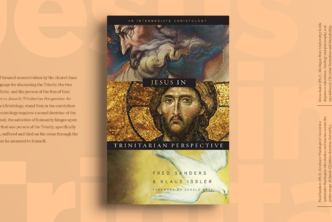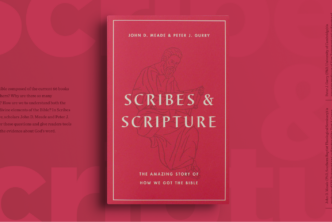As a book nerd since birth, few things are as fun for me as a list of book recommendations. (I haven’t read all the books I’ve gotten off recommendations—my bookshelf is about good intentions, thanks for asking!) That’s why I’ve been extra excited to see what books my friends and colleagues suggest for summer reading.
I hope you have time for some reading this summer, and we at Logos encourage you to pick a book or two that push you beyond your comfort zone, academically, intellectually, theologically, or spiritually. You never know what joy you’ll discover if you put in the extra effort to read something new.
With that in mind, here are twenty books recommended by some of the fine people on the Logos team, which we hope you’ll enjoy as much as we did.
1. Women of the Word, by Jen Wilkin
“There’s a richness to listening to Jen Wilkin read her book about studying scripture. This is a practical guide to going deeper in your Bible study, written for women who love the Bible and want to learn for themselves how to interpret what the Word truly means. Wilkin is careful in her counsel, exhorting listeners to develop a deeper love for God by thoughtfully engaging with scripture. Listeners will learn how to use their minds in addition to their hearts as they follow the study framework Wilkin uses. I’ve recommended this book to three women in the past two days!”
—Kristen T.
2. God Has a Name, by John Mark Comer
“I highly recommend this book to anyone who will listen. It’s an approachable and engaging line-by-line study on the character of God based on his own definition of his name in Exodus 34:6–8. Before reading this, I had never realized how often other parts of the Bible reference the character of God using verbiage from this verse. It’s given me a fresh view on God’s character and opens up additional significance to verses throughout the entire Bible. This is a great read for Christians—new or old—who are looking to get to know more about who God says he is.”
—Christina M.
3. Biblical Theology: A Canonical, Thematic, and Ethical Approach, by Andreas Köstenberger and Gregory Goswell
“Köstenberger and Goswell created a treasure trove for pastors and serious students of the Bible to mine the biblical–theological gold from each book of the Bible. This is a reference work that will be used for generations to come! Pastors will use it to prepare for a new sermon series and it will be a vehicle to take people deeper into the various threads of Scripture.”
—Jeromy B.
4. Stories with Intent: A Comprehensive Guide to the Parables of Jesus (2nd ed.), by Klyne Snodgrass
“I picked up this title on a recommendation from my colleague Mark Ward, and found that it checked so many boxes. I was studying Luke 10:25–37, and Snodgrass was a helpful guide through how to categorize parables, what we should ask about each, and in particular, what we can gain from the parable of the Good Samaritan that goes beyond your childhood flannelgraph. Dense with background, primary and secondary sources, and theological reflections, Stories with Intent can help broaden your perspective on what and how the parables teach us.”
—Yours truly, Jennifer G.
5. Live No Lies: Recognize and Resist the Three Enemies That Sabotage Your Peace, by John Mark Comer
“John Mark Comer writes the kind of books you walk away from wondering, ‘Why isn’t everyone talking about this?’ In Live No Lies, he digs into the topics of the world, the flesh, and the devil in a way that’s knowledgable, curious, and approachable. I think it’s a great read to better understand the spiritual battles at play in our cultural moment and the everyday practices to resist these enemies of our peace.”
—Kyle B.
6. Every Good Endeavor: Connecting Your Work to God’s Work, by Timothy Keller
“I’ve spent a decade in bi-vocational worship ministry, and always had this nagging feeling that my non-church jobs weren’t as important to God. This book flipped that idea on its head. Keller presents stories and practical ways a Christian view of work can’t be contained by the walls of a church.”
—Kyle B.
7. Genesis, by Walter Brueggemann
“I’ve never read a commentary that I wanted to read straight through. This title provides enormous context and commentary on the text while remaining an engaging, and frankly a devotional read.”
—Kyle A.
8. Old Testament Theology: Israel’s Gospel, by John Goldingay
“This book is a great option for someone wanting to get a good overview of the entire Old Testament. It’s structured in such a manner that the reader is able to walk through the Old Testament from Genesis to Malachi and get a coherent narrative of the Jewish faith.”
—Kyle A.
9. The Coming of God: Christian Eschatology, by Jürgen Moltmann
“An advanced systematic theology text that serves as an entire systematic theology volume through the lens of eschatology. It’s a hopeful and prophetic look at God’s future that’s sensitive to the socio-political struggles of today.”
—Kyle A.
10. What Grieving People Wish You Knew about What Really Helps (and What Really Hurts), by Nancy Guthrie
“A powerful and practical book that will help you know what to say (and not to say) when friends or family members experience bereavement. It’s written from personal experience (two of Guthrie’s children died in infancy) and with a pastoral heart. Scattered through the book are dozens of anecdotes from others who have experienced grief, often describing loving acts of kindness from friends. They prove that simple gestures from a Christ-centered soul can make the world of difference to the broken-hearted. Read this before you need it, and you’ll soon be very thankful you did.”
—Mark B.
11. Christ-Centered Preaching: Redeeming the Expository Sermon (3rd ed.), by Bryan Chapell
“Recently I was astonished to discover that it was twenty-five years since I first went to Bible college. Time flies—and it was high time for a refresher! Bryan Chapell’s Christ-Centered Preaching delivers on the title. It’s an excellent textbook, suitable both for seminary students and old hands who realize they’ve still got lots to learn. It can occasionally be a little wooden, but Chapell fills page after page with helpful, sage advice that leaves plenty of room for different gifts and personality. I will return to this again and again.”
—Mark B.
12. 12 Ways Your Phone Is Changing You, by Tony Reinke
“It’s rare to find a book so thoughtful, well-researched, challenging and thoroughly rooted in biblical principles. Reinke doesn’t argue against smartphones or social media, but he does want Christians to be aware of their negatives so we can change our behaviour for the better. I consider myself a careful user of technology, but Reinke’s book challenged me. I’d highly recommend it to any Christian who spends more than fifteen minutes a day on their phone or using social media.”
—Mark B.
13. Jesus and the Eyewitnesses: The Gospels as Eyewitness Testimony, by Richard Bauckham
“Jesus and the Eyewitnesses is an academic work arguing for something most evangelicals instinctively believe, that the gospels were written by eyewitnesses or by those who had spoken to eyewitnesses. Bauckham’s interaction with non-evangelical scholarly viewpoints can be demanding, but it makes the book very useful for interacting with friends who have imbibed the popular myth that the four gospels are unreliable. It’s scholarly, robust, and fresh, and while it has plenty of idiosyncrasies, its central premise is compelling.”
—Mark B.
14. The Nicene Creed: An Introduction, by Phillip Cary
“Phillip Cary is an excellent teacher and writer, so it was a true delight to be able to publish him (yes, I’m biased—this is a Lexham Press book). This is an incredibly concise yet profound introduction to and summary of the Nicene Creed. Cary shows that the Creed unites Christians throughout history by giving us words for what we already believe. I wish every Christian would read it.”
—Lindsay K.
15. Old Testament Use of Old Testament: A Book-by-Book Guide, by Gary Edward Schnittjer
“Christians know that the New Testament quotes the Old Testament. But many are less familiar with the fact that the Old Testament quotes itself. This book documents hundreds of places where the Old Testament interprets earlier Old Testament passages. Studious Christians can better learn how to interpret Scripture by seeing it happen in our very Bibles!”
—Lindsay K.
16. Athanasius: The Life of Antony and the Letter to Marcellinus, by Athanasius of Alexandria
“Athanasius’s Letter to Marcellinus is the best thing I’ve read on the Psalms. In so few pages, he manages to say more than any modern textbook. And he rightly agrees with the New Testament that the Psalms are all about Jesus!”
—Lindsay K.
17. Stewards of Eden: What Scripture Says about the Environment and Why It Matters, by Sandra L. Richter
“I’ve read books on creation care before, but this one stood out in that Richter is an Old Testament scholar and her approach is focused on interpreting and applying the Bible, and especially Old Testament texts. It is also fairly short and accessible to someone who might not be familiar with scholarly discussions.”
—Elliot R.
18. Martin Luther and the Rule of Faith: Reading God’s Word for God’s People, by Todd Hains
“I’m neither a Lutheran nor a Luther scholar. But this book by my editorial colleague Todd Hains was engaging because it is really about how Martin Luther read the Bible according to the rule of faith and, in turn, how we might better read the Bible.”
—Elliot R.
19. How to Have an Enemy: Righteous Anger and the Work of Peace, by Melissa Florer-Bixler
“How to Have an Enemy explores the biblical concept of enemies and offers insights on how Christians can respond to them in accordance with Jesus’ call to love our enemies. According to Florer-Bixler, the work of peace cannot be to simply ignore our enemies; rather, we should acknowledge and confront them as Jesus did, with love and righteous anger. To turn enemies into friends, we must first address the reasons why they are enemies; here Florer-Bixler focuses largely on power and how it can and has been used to harm others. Additionally, she proposes that we can work towards peace by deconstructing the power structures that contribute to the creation of enemies in the first place. It is a thought-provoking book that challenges readers to examine what it means to love our enemies, as well as how we ourselves can act as enemies to the gospel of Jesus. A challenging and highly relevant read, it’s both a call to repentance and a call to participate in the work of peacemaking. I highly recommend this book!”
—Jessica P.
20. Tell Her Story: How Women Led, Taught, and Ministered in the Early Church, by Nijay Gupta
“Tell Her Story is a clear and uncomplicated read that shines a light on the lives and impact of women throughout the Bible, women whose stories have often been overlooked or devalued. Gupta does an excellent job of bringing the women of the early church front and center, illustrating how they have always filled important leadership and teaching roles within the church, and should continue to do so today. Tell Her Story does just that.”
—Jessica P.
Tell us what you think!
What’s on your summer reading list? Did you pick up one (or more) of these books? Join our conversation about summer reading by tagging Logos on Facebook, Twitter, or Instagram when you post pictures by the pool, beach, mountains, or coffee shop (when you need a break from the kids).






